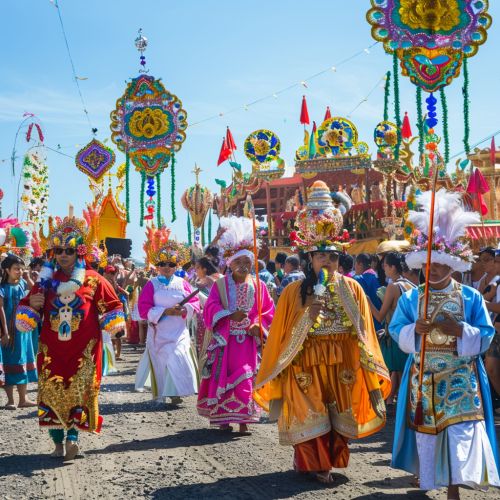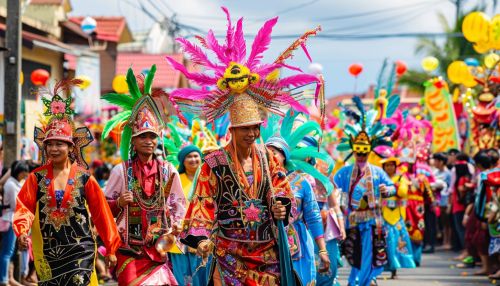Festival
Definition and Significance of Festivals
A festival is a period of celebration, typically for religious, cultural, or social reasons. Festivals often serve to fulfill specific communal purposes, especially in regard to commemoration or thanksgiving. They may also provide entertainment, which was particularly important to local communities before the advent of mass-produced entertainment. Festivals are also associated with holidays and are often marked by public celebrations, feasts, and various forms of entertainment.
Historical Context
The history of festivals dates back to ancient civilizations. The ancient Egyptians celebrated numerous festivals, many of which were tied to their religious beliefs and agricultural cycles. Similarly, the ancient Greeks held festivals such as the Dionysia, which honored the god Dionysus and included theatrical performances. The Romans also had a rich tradition of festivals, including Saturnalia, which influenced modern Christmas celebrations.
Types of Festivals
Religious Festivals
Religious festivals are deeply rooted in the traditions and beliefs of a community. They often commemorate significant events in the history of a religion or honor deities and saints. Examples include Diwali, the Hindu festival of lights; Eid al-Fitr, marking the end of Ramadan in Islam; and Christmas, celebrating the birth of Jesus Christ in Christianity.
Cultural Festivals
Cultural festivals celebrate the heritage, traditions, and customs of a community. These festivals often include music, dance, food, and other cultural expressions. Examples include Carnival, which is celebrated in many countries around the world, and the Chinese New Year, which marks the beginning of the lunar new year.
Seasonal Festivals
Seasonal festivals are tied to the agricultural calendar and the changing of the seasons. They often celebrate the harvest or the beginning of a new season. Examples include Thanksgiving in the United States, which celebrates the harvest, and Midsummer, which marks the summer solstice in many European countries.
National Festivals
National festivals celebrate significant events in a country's history or honor national symbols and heroes. Examples include Independence Day in the United States, which commemorates the signing of the Declaration of Independence, and Bastille Day in France, which marks the beginning of the French Revolution.
Components of Festivals
Rituals and Ceremonies
Rituals and ceremonies are often central to festivals. These may include religious rites, processions, and other formal activities that hold symbolic meaning. For example, during Easter, Christians participate in various rituals such as the Easter Vigil and the Stations of the Cross.
Music and Dance
Music and dance are integral components of many festivals. They provide entertainment and serve as a means of cultural expression. For instance, the Rio Carnival is famous for its samba parades, while the Edinburgh Festival Fringe features a wide range of musical performances.
Food and Drink
Food and drink play a significant role in festivals, often reflecting the culinary traditions of a community. Special dishes and beverages are prepared and consumed, sometimes with symbolic meanings. For example, during Passover, Jews eat matzah to commemorate the unleavened bread eaten by the Israelites during their exodus from Egypt.
Decorations and Costumes
Decorations and costumes add to the festive atmosphere and often have symbolic significance. For instance, during Halloween, people wear costumes to ward off evil spirits, while during Hanukkah, Jewish homes are decorated with menorahs and other symbols of the festival.


Economic and Social Impact
Festivals have a significant economic and social impact on communities. They can boost local economies through tourism and the sale of goods and services. Festivals also foster social cohesion by bringing people together and promoting a sense of community. For example, the Oktoberfest in Munich attracts millions of visitors each year, contributing significantly to the local economy.
Challenges and Controversies
While festivals are generally seen as positive events, they can also pose challenges and controversies. Issues such as commercialization, cultural appropriation, and environmental impact are often raised. For example, the Burning Man festival has faced criticism for its environmental footprint and the commercialization of what was originally an anti-consumerist event.
Future of Festivals
The future of festivals is likely to be shaped by various factors, including technological advancements, changing social norms, and global events. Virtual festivals have become more common, especially in response to the COVID-19 pandemic, allowing people to participate in celebrations from the comfort of their homes. Additionally, there is a growing emphasis on sustainability and inclusivity in festival planning and execution.
See Also
- Carnival
- Chinese New Year
- Diwali
- Eid al-Fitr
- Christmas
- Thanksgiving
- Midsummer
- Independence Day
- Bastille Day
- Rio Carnival
- Edinburgh Festival Fringe
- Passover
- Halloween
- Hanukkah
- Oktoberfest
- Burning Man
